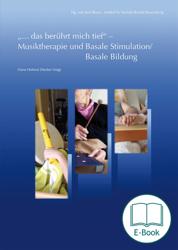This book presents music therapy - in terms of both practical initiatives and theoretical background - for anyone who works with people (the interactive professions). It takes a perspective based on phenomenology and developmental psychology. Music therapy is set in the context of logotherapy and existential psychotherapy as described by Viktor F. Frankl and is viewed in terms of these concepts.
The concept of “basic stimulation” (Basale Stimulation as used by Bienstein, Fröhlich and many others) comes originally from areas such as geriatric care and work with coma and PVS (persistent vegetative state) patients, a group needing complete care. It is based on accounts of the effect of tactile-haptic stimulation (touch) on the affective state of the client and the ways in which the client can be helped to experience such stimulation (e.g. in the holistic perception of washing procedures).
The author first encountered this work during his projects in the hospice movement, palliative medicine and gerontology. In this book he links it with the principles and practice of music therapy against a background of thought that is rooted in phenomenology and developmental psychology. Accordingly, emphasis is given to the basic connections involved in the client's tactile, haptic and auditory perception which is itself viewed as a truly multimedia experience stimulating human communication.
The practical and theoretical topics include touching and humming/ singing, touching in the structure of a sonata and singing songs relating to the client’s own musical biography (with clients and / or the people closest to them). In this connection the author establishes a new theoretical context for music therapy by linking it with, and thus basing important parts of it upon, the logotherapy and existentialanalytical psychotherapy of Viktor F. Frankl.
This book is written first and foremost for all the social professions (kindergarten teachers, those caring for and teaching people with disabilities, social pedagogues, specialist nurses and carers etc.). The aim is to make clear how music can - and should - be seen as a physical stimulant and, in addition, as a factor influencing the individual's emotional and affective balance to induce vitalisation and deep relaxation. This has consequences for therapeutic care.
The book includes very simple single-tone exercises and vocal forms; these can be played either to the client (“Fürspiel”, Timmermann) or with the client while recognising the importance of the intermediate playing space. It also combines proven practical approaches with theoretical models (some of which are extended) from both receptive and active music therapy (as described by Frohne-Hagemann, Hegi and many others). More complex musical interactions are prepared and lead to the final section in which practical models are offered.
Music therapy is now a recognised health specialty and has long been established as an academic discipline. Against this background the book recommends that all members of the interactive professions (those who work with people) should have a basic knowledge of music therapy methods and should be able to apply them.
The book's editor is Kurt Brust, Director of the Institute for Social Professions and Training Academy in Ravensburg, Germany. The institute places particular emphasis on the holistic view of the human as mind, body and spirit. This view is independent of the state of health, which is initially irrelevant for the teaching process. A new all-round need for “basic education” (Basale Bildung) is identified - a need that is greatest in people with severe disabilities.
Kurt Brust, 1978–1982 Lehrerstudium an der Pädagogischen Hochschule in Weingarten (Deutsch/Politologie), 1982–1997 Arbeit in der Stiftung Liebenau bei Menschen mit hohem Assistenzbedarf. Grundlage der Arbeit waren verschiedene Konzepte der Basalen Bildung (Andreas Fröhlich, Winfried Mall und Barbara Fornefeld), 1990–1996 berufsbegleitendes Studium der Diplompädagogik in Reutlingen/Tübingen, Schwerpunkt war die außerschulische Arbeit mit Menschen mit Behinderungen, 1997–2002 Dozent am Institut für Soziale Berufe Ravensburg (Fachschule für Heilerziehungspflege), 2002–2005 Fachbereichsleiter der Fachschule für Heilerziehungspflege am Institut für Soziale Berufe in Ravensburg, 2005–2008 Direktor des Institutes für Soziale Berufe Ravensburg, 2008 – Heute Geschäftsführer und Direktor des Institutes für Soziale Berufe Ravensburg.
Prof. Dr. Dr. h.c. Hans-Helmut Decker-Voigt, M.A.Lesley Coll., Cambridge/USA, Prof. h.c.der Kunstwissenschaften und Dr.h.c. der Rostropovitch-Hochschule Orenburg/ Russ. Gründungsdirektor des Instituts für Musiktherapie der Hochschule für Musik und Theater Hamburgvon 1990 bis 2010, seit der Emeritierung 2010–2015 Senior-Professor, weiterhin Leitung des Promotionsstudienganges (alter Ordnung) und der Forschungsstelle künstlerische Therapien am o.g. Institut. Präsident der Akademie der Herbert von Karajan-Stiftung Köln (vorm. Berlin), seit 2014 Leiter der Musiktherapie-Seminare in der Akademie für Fortbildung des Instituts für Soziale Berufe Ravensburg. Gründungsmitglied des Verbandes deutscher Schriftsteller (VS), Herausgeber und Autor verschiedener Lehrwerke mit Übersetzungen in 14 Sprachen, Gründungsherausgeber der Zs. „Musik und Gesundsein“, Gast- und Stiftungsprofessuren in USA, Taiwan, Japan, Ungarn, Estland, Russland, China.
www.decker-voigt-archiv.de


 Table of Contents
Table of Contents